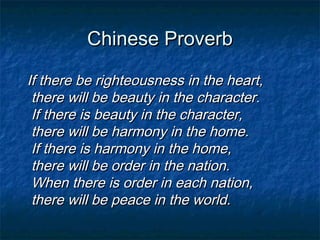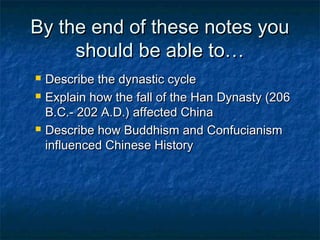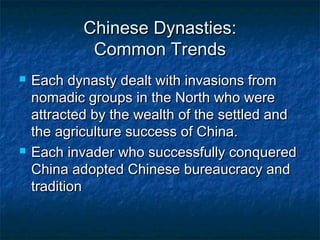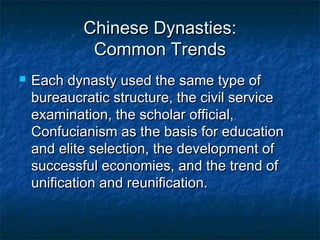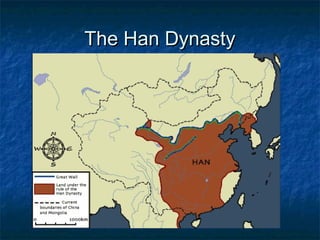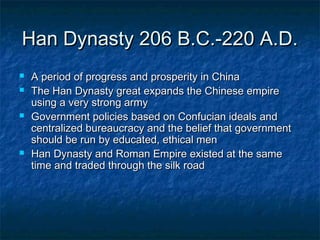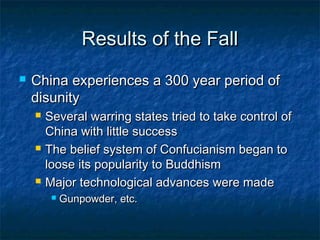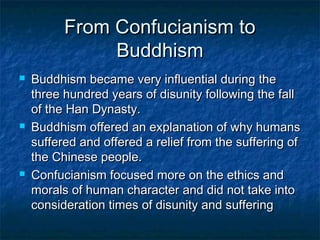Fall of han dynasty
- 1. Chinese Proverb If there be righteousness in the heart, there will be beauty in the character. If there is beauty in the character, there will be harmony in the home. If there is harmony in the home, there will be order in the nation. When there is order in each nation, there will be peace in the world.
- 2. Do Now Pick up a lined sheet of paper from the back counter…split in half and share Define the following vocab terms: Scholar Official Mandate of Heaven Bureaucracy Dynastic Cycle Civil Service Exam
- 3. By the end of these notes you should be able to… Describe the dynastic cycle Explain how the fall of the Han Dynasty (206 B.C.- 202 A.D.) affected China Describe how Buddhism and Confucianism influenced Chinese History
- 4. Chinese Dynasties: Common Trends Throughout history Chinese government had been controlled by dynasties and between each dynasty was a period of disunity Chinese dynasties went through a process commonly referred to as the “Dynastic Cycle” or “Cycle of Chinese Dynasties” Chinese dynasties would have a strong rise, a long tenure (period of rule), and a sharp fall. All determined by the Mandate of Heaven.
- 6. Chinese Dynasties: Common Trends Each dynasty dealt with invasions from nomadic groups in the North who were attracted by the wealth of the settled and the agriculture success of China. Each invader who successfully conquered China adopted Chinese bureaucracy and tradition
- 7. Mandate of Heaven The Mandate of Heaven is based on four principles: The right to rule is granted by Heaven. There is only one Heaven therefore there can be only one ruler. The right to rule is based on the virtue of the ruler. The right to rule is not limited to one dynasty. Here are some of the ways these principles converted into action and justification: It gives the ruler prestige and religious importance. It gives the ruler supreme power. It allows a new ruler to gain power quickly if the people believe he has the 'Mandate of Heaven'. A ruler's power must be kept in check by virtue (He or She has to be honest). The Mandate of Heaven justifies rebellion as long as the rebellion is successful. Simply because it was successful, obviously then, the new ruler had to have had a Mandate from Heaven.
- 8. Chinese Dynasties: Common Trends Each dynasty used the same type of bureaucratic structure, the civil service examination, the scholar official, Confucianism as the basis for education and elite selection, the development of successful economies, and the trend of unification and reunification.
- 10. Han Dynasty 206 B.C.-220 A.D. A period of progress and prosperity in China The Han Dynasty great expands the Chinese empire using a very strong army Government policies based on Confucian ideals and centralized bureaucracy and the belief that government should be run by educated, ethical men Han Dynasty and Roman Empire existed at the same time and traded through the silk road
- 11. Fall of Han Dynasty Fell because of it’s own success Growing population The financial difficulties brought on by increasing wealth Rivalries Ever more complex political institution
- 12. Results of the Fall China experiences a 300 year period of disunity Several warring states tried to take control of China with little success The belief system of Confucianism began to loose its popularity to Buddhism Major technological advances were made Gunpowder, etc.
- 13. From Confucianism to Buddhism Buddhism became very influential during the three hundred years of disunity following the fall of the Han Dynasty. Buddhism offered an explanation of why humans suffered and offered a relief from the suffering of the Chinese people. Confucianism focused more on the ethics and morals of human character and did not take into consideration times of disunity and suffering
